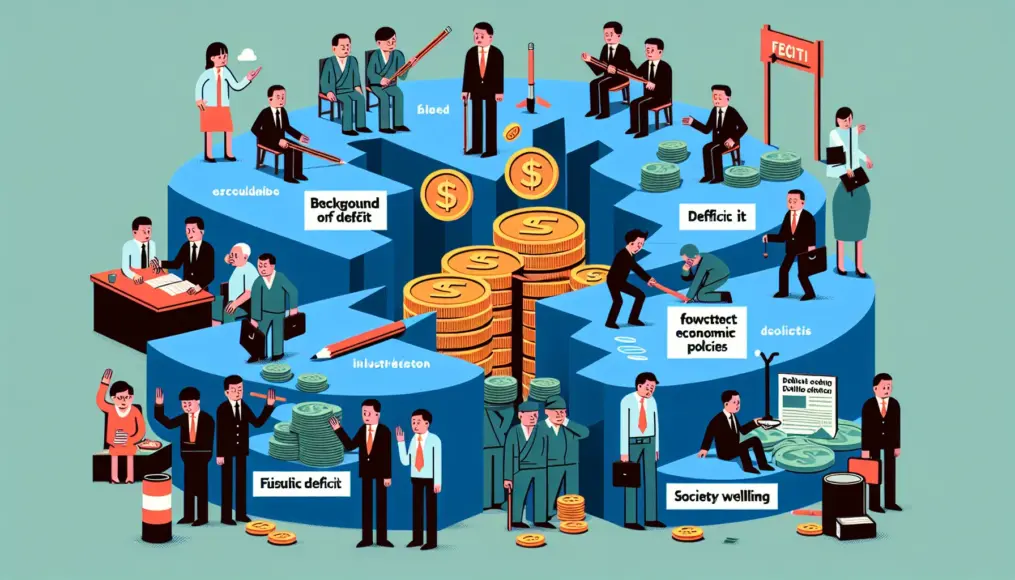Fiscal deficits are a crucial issue that significantly affects our lives and the economy. Recently, politicians have been implementing various policies to address this concern, but the underlying factors are often complex. In this article, we will explore the effects of fiscal deficits and examine how the relationship between economics and politics intertwines.
Let’s start by looking at historical examples of fiscal deficits and the reasons they arise. We’ll then analyze how these deficits impact economic policy and affect citizens’ daily lives. Finally, we’ll delve into politicians’ experiences to shed light on their efforts to reduce deficits and the outcomes of those initiatives. By the end of this read, you’ll have a deeper understanding of the essence of fiscal deficits.
- Uncover the history and causes of fiscal deficits
- Analyze the impact on economic policy
- Reflect on the efforts of politicians and their influence on citizens’ lives
Understanding the Background and Causes of Fiscal Deficits
Fiscal deficits are a significant challenge in the management of a nation’s finances. A deficit occurs when a government spends more than it earns. While a temporary deficit may not pose a problem, prolonged deficits can negatively impact the economy and society. In this section, we will explore historical examples of deficits and the factors that contribute to their occurrence.
Historical Examples of Deficits
Looking back in history, there have been several instances where fiscal deficits became a substantial issue. For example, during times of war or economic crises, nations often engage in large-scale spending for defense or economic measures. In such situations, deficits can be unavoidable. Additionally, various policies implemented by governments have also contributed to the increase in deficits. By understanding this historical context, we can gain deeper insights into contemporary fiscal deficits.
- Past wars and economic crises can lead to deficits
- Government policies influence fiscal deficits
- There is much to learn from historical examples
Factors That Lead to Deficits
Fiscal deficits are caused by a variety of factors. First, when economic growth slows, tax revenues decline, leading to deficits. Additionally, the rising costs of social security due to an aging population also contribute to increased government spending. Furthermore, policy missteps and wasteful expenditures can exacerbate deficits. Understanding these factors is the first step toward addressing fiscal deficits.
- Decline in tax revenue due to slow economic growth
- Increased social security costs from an aging population
- Policy mistakes and wasteful spending expand deficits
The Impact on Economic Policy
Budget deficits significantly shape economic policy. When deficits persist over time, they can lead to shifts in government monetary policy and spending strategies. In this article, we’ll explore how budget deficits influence monetary policy and the effects of government spending on the economy.
Changes in Monetary Policy
As budget deficits grow, central banks often need to adjust their policies regarding interest rates and the money supply. For instance, if a government raises interest rates to curb the deficit, borrowing costs increase, which could slow down investment activities by businesses and households. This situation may create a vicious cycle where economic growth stagnates, further exacerbating the deficit. Therefore, managing budget deficits is crucial for maintaining stability in monetary policy.
- How budget deficits influence monetary policy
- The effect of interest rate hikes on economic activity
- The importance of deficit management for monetary stability
The Impact of Government Spending on the Economy
Government spending directly affects the economy. When a budget deficit arises, the government may need to cut expenditures. These reductions can impact public services and social security, ultimately harming citizens’ living standards. Conversely, increasing spending to stimulate the economy can also heighten the risk of an expanding deficit, making it essential to strike a balance.
- The direct influence of government spending on the economy
- The negative impact of spending cuts on citizens’ lives
- The risk of increased deficits from spending aimed at economic stimulation
Insights from Politicians on Addressing Budget Deficits
Budget deficits are a persistent challenge for politicians, often occupying their thoughts and strategies. Efforts to reduce deficits and the lessons learned from these endeavors are critical resources for shaping future policies. In this section, we will explore how politicians have approached deficit reduction and the insights gained from both successes and failures.
Efforts Toward Deficit Reduction
Many countries have implemented specific measures to tackle their budget deficits. For instance, governments often revisit spending and reform tax systems. Cutting expenditures typically involves reevaluating public projects and social welfare programs, which requires understanding and cooperation from citizens. It’s crucial for politicians to share information transparently and earn the trust of taxpayers.
- Government spending reviews and tax reforms are implemented
- Citizen understanding and cooperation are vital
- Transparency builds trust
Examples of Successes and Failures
Deficit reduction can lead to both success and failure. One success story involves a country that adopted strict fiscal discipline, significantly reducing its deficit in a short period. Conversely, there are cases where excessive cuts to spending hindered economic growth, ultimately resulting in an increased deficit. Learning from these examples can help inform better decisions in future policy-making.
- Successful implementation of fiscal discipline in a certain country
- Increased deficits due to excessive spending cuts
- Learning from examples is crucial
Impact on Citizen Life and Society
Fiscal deficits don’t just affect a country’s economy; they also have significant repercussions for citizens’ lives and society as a whole. When deficits persist, the government often has to implement various measures to restore fiscal balance, which can lead to changes in tax burdens and social welfare services. In this section, we will explore the specific impacts of fiscal deficits on citizens and society.
Changes in Tax Burden
As fiscal deficits widen, the government typically needs to increase tax revenue to cover the shortfall. This can result in higher income taxes and sales taxes, leading to an increased tax burden for citizens. For individuals, this often means a decrease in disposable income, which can negatively affect their quality of life. Furthermore, rising tax burdens can suppress consumption, potentially harming the overall economy.
- Fiscal deficits lead to increased tax burdens
- Significant impacts on income and consumption
- Consumption suppression may adversely affect the economy
Impact on Social Welfare
Prolonged fiscal deficits may prompt the government to reassess or cut social welfare services. This can directly impact essential services such as education, healthcare, and pensions, affecting citizens’ daily lives. Vulnerable groups, such as low-income individuals and the elderly, face a heightened risk of declining quality of life as a result. Thus, understanding the implications of fiscal deficits is crucial for safeguarding the well-being of citizens.
- Fiscal deficits affect social welfare services
- Education, healthcare, and pensions may be reassessed
- Increased risks for vulnerable populations
Conclusion
Fiscal deficits are a crucial issue that significantly impacts our lives and society. By examining historical examples of deficits and understanding the underlying causes, we gain valuable insights into today’s deficit challenges. The effects of deficits on economic policies and citizens’ daily lives cannot be overlooked; changes in tax burdens and social welfare directly influence our everyday experiences.
Lessons learned from politicians’ experiences and initiatives will also be beneficial for future fiscal management. When it comes to shaping policies aimed at reducing deficits, it’s essential to learn from both successes and failures. With this knowledge in hand, it’s crucial for each of us to take an interest in and deepen our understanding of the fiscal deficit issue.
- Fiscal deficits affect citizens’ lives and the economy
- There are valuable lessons to learn from politicians’ efforts
- Deepening our understanding of deficit issues is vital
To consider our future, enhancing our understanding of fiscal deficits is key. We would love to hear your thoughts and feedback on this article!



Comment